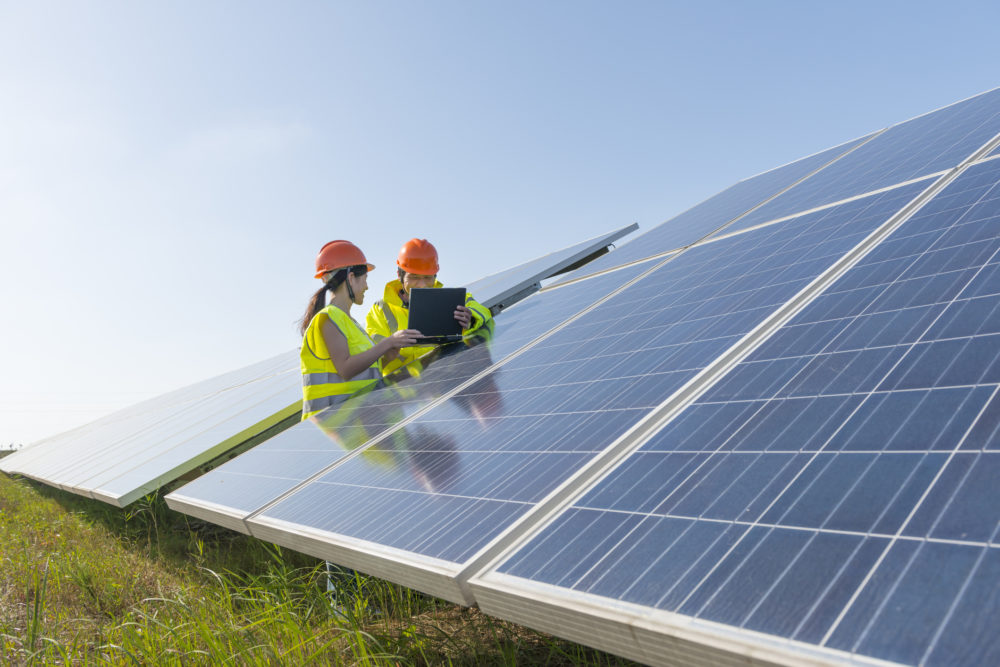Ukrainian crisis must lead to faster green energy transition for Europe
Maria Mendiluce, CEO, We Mean Business Coalition and Eliot Whittington, Director, CLG Europe
The EU’s decision to move away from Russian gas must spur greater investment in renewables and energy efficiency.
*This article first appeared on Thomson Reuters Foundation News
The Russian invasion of Ukraine is both a humanitarian catastrophe and a systemic shock to the global economy. It has shown, in the starkest terms, the systemic risks caused by our continued dependence on fossil fuels.
The war is causing devastation to people’s lives and creating shockwaves around the world. Global food and energy security will be impacted for months to come. For businesses, the spike in energy prices will further hamper their ability to deliver the products and services we rely on.
Businesses across Europe will take heart from the European Commission’s “REPowerEU” communication, which aims to reduce the EU’s fossil gas imports from Russia by two-thirds by the end of this year. This, along with recent calls from MEPs to increase clean energy targets, gives the private sector more confidence that the EU will press forward with its “Fit for 55” package with greater urgency, accelerating the roll out of renewables and increasing energy efficiency.
While governments seek to manage the huge disruption to energy markets from the Ukraine crisis, they can build increased energy and economic security for the long term by accelerating the global energy transition away from fossil fuels: this is the right moral, strategic and sustainable decision.
While navigating the short-term challenges, the EU’s decision to move away from Russian gas must not lead to costly investments that lock in dependence on other sources of gas or increase the share of coal. Emergency measures will need to support people to cope with massive price shocks, but it’s critical that any steps taken to maintain energy supply are made with long-term energy security in mind.
This means diversification of energy sources and investment in grid infrastructure and storage, alongside electrification and technologies like carbon capture and storage.
Business supports a rapid energy transition. In an open letter to the G20 leaders, around 800 companies called on governments to commit to public procurement of renewables to help stimulate corporate procurement. With clear policy direction, business can help deliver the transition to renewables – the most efficient, scalable solution to both the energy and climate crises.
New renewable energy sources are already reducing gas demand in Europe. The cost of renewables is at an all-time low, which helped persuade over 350 major companies globally through RE100 to switch to 100% renewable power: sourcing nearly 45% of their electricity needs from renewable sources in 2021.
To make it easier for companies to transition to renewable power, the EU should focus on delivering grid infrastructure for renewables and electric transport while supporting business to rapidly roll out better home insulation and increase heat pump innovation, all of which will be hugely beneficial to citizens.
Increasing energy efficiency to support heating and building renovation is a critical short-term measure to help reduce the amount of energy that Europe needs and to cut household costs.
We encourage the European Commission and member states to strengthen and clarify how they will increase energy efficiency in the REPowerEU plan that has been promised by summer.
Since European buildings use around 40% of the total energy consumed by the bloc, accelerating energy efficiency improvements in buildings and industry, and speeding up the replacement of gas boilers with heat pumps, would significantly reduce demand for gas imports.
Electrifying transportation is also key to transitioning away from Russian oil, as well as providing benefits – like cleaner air – to communities, businesses and economies. It is also the right time to support wider adoption of electric vehicles, since they are already approaching price parity with the internal combustion engine and will be cheaper to produce than conventional vehicles by 2027.
Reliable renewables
Business needs the EU to adopt an ambitious Fit For 55 package as quickly as possible this year. EU politicians should respond to this crisis with unprecedented resolve, commitment and solidarity, delivering a clear vision of a Europe committed to ending its dependency on fossil fuels quickly, fairly and effectively
We are saddened by the devastating impact of this invasion on the Ukranian people and made hopeful by the solidarity of European people and the renewed unity around the core of our European values.
We now understand clearly the inherent fragility of a global economic model that relies upon a few countries producing fossil fuels to meet our energy needs. This is a historic moment for Europe when we can usher in a new international energy security strategy that builds on the strengths of reliable renewable energy, improved energy efficiency and buildings renovation.
Business and governments agree that energy self-sufficiency and security bring political independence and stability. We know that this is what people and businesses need to thrive.

